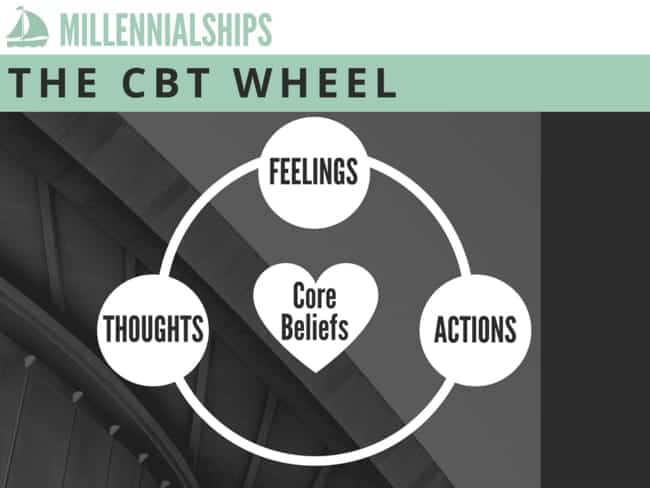Learning how to stop negative thoughts doesn’t have to be as hard as everyone says it is. I know that a lot of people like to talk about how “your anxiety is like the ocean” and describe mental health using a bunch of metaphors, but that’s not what this is about.

How To Stop Negative Thoughts
The ocean metaphors are helpful sometimes, but this blog post is about straight-up scientifically proven ways that you can use when learning how to stop negative thoughts. Thoughts that will lead to stress, anxiety or depression.
Cognitive behavioral therapy (CBT)
The methods that I’m going to discuss below all come from CBT, which is one of the most effective (scientifically proven) methods for treating negative thinking and learning how to stop negative thoughts.
Yes, guys – there is a scientifically proven treatment to stop negative thoughts!
The first thing you need to understand is the CBT wheel. It’s very simple and looks like this:

The wheel is made up of four things: Thoughts, Feelings Actions and Core Beliefs.
Core beliefs
Core beliefs are the result of the three things in the circle. Let’s use an example.
Thought: “I am ugly”
Feelings: Lack of self-confidence, social anxiety
Actions: Avoiding people, not looking them in the eye, not wanting to talk to them
Core Belief: Everybody hates me because I’m ugly
The power of the wheel
The best part about the CBT wheel is that we can start changing our core beliefs by changing just one of the pieces of the wheel.
Self Care activities often focus around changing your actions. They involve going out to see friends, taking a relaxing bath, exercising etc. and this is a great way to start!
But.
You can also start changing the “thoughts” part of the wheel, and this is what we’re going to focus on today.
Automatic thoughts
When we’re talking about “changing our thoughts” it’s important to understand what an automatic thought is. These are the thoughts that just pop into our heads without our say. They are thoughts we just think about and we don’t really control them.
These are not the thoughts we want to control or change.
Those thoughts (negative or positive) will just happen to us and trying to fight them is sure to backfire.
Instead, we want to focus on the thoughts that come into our head after we have an automatic thought.
Related Posts:
- 18 Self Care Products that Will Calm Your Chaos
- How To Fight Anxiety
- The Self Care Morning Routine that Changed My Life
- Self Care is Not Selfish: How Putting Yourself First Helps Others
Is this helpful?
This is the first thought that we should put into our head after we have an automatic thought. We need to ask ourselves immediately if the thought we just had is helpful or not.
If it is not helpful, we need to acknowledge that and replace it with a more helpful thought. This is an example of how that exchange might play out in your head:
“My hair colour is so ugly”
“Is that helpful?”
“No”
“Is there a positive thought I can replace that thought with?”
“Today the new episode of Game of Thrones comes out, woo hoo!”
See? the positive thought doesn’t even need to relate to the original problem. In fact, it’s probably better if it doesn’t because if your core belief is that you’re ugly, it might be very difficult for you to think of something positive about your appearance.
That being said, if you can think of something positive related to the automatic thought that’s even better.
This won’t feel natural at first!
I’m so sorry to say this guys but this is not a sugar-coated motivational kind of post. This is the real deal. Doing this method on a regular basis will take away your negative thoughts but it takes time and effort and it won’t be easy right away. Just remember that it will help and start working eventually so don’t give up.
A pink elephant balancing on a red ball
Another way to handle a negative automatic thought is to just completely interrupt it. Just totally throw it off by thinking of something completely random, even ridiculous.
A pink elephant balancing on a red ball and juggling would work.
So would a red panda eating a giant cupcake.
Anything that you can think of to throw your brain off the self-deprivation track is going to be helpful. I know this sounds crazy, and like I said it will feel weird at first but you are training your brain.
Pssst. You might be interested in my Free Self-Care challenge.
Imagine you’re preparing for a marathon.
When you’re at the gym you might run on the treadmill but you also might do other things that will help with the training that aren’t so directly related to running. You might lift weights, do lunges or jump with a skipping rope.
Training for something doesn’t always have to look like the end result. The pink elephant is just a method to get to the end result which is… no more negative automatic thoughts.
The pink elephant doesn’t have to be part of your life forever. We’re just using it as a tool to get to where we want to go.
I am…human
Putting words after “I am” is very dangerous territory. It’s really something you should never do.
When you say “I am” you are tying a certain word to your actual identity. There are very few things in which we actually are. You can say:
- I am human
- I am 5 foot 2 (or whatever height you are)
- I am Caucasian (or whatever nationality you are)
- I am a woman (or whatever gender you are)
and..I’m already running out of things.
Whenever you say “I am…” the word after that needs to be an objectively true fact. Here are things that don’t fit that category:
- I am ugly
- I am a loser
- I am worthless
- I am a burden to others
- I am unlucky
Even positive “I Am” statements are bad
Let me explain why.
When you say “I am a good mother” you are making that skill part of yourself, part of your identity.
Let’s say one day you go to change your son’s diapers and notice that there are no clean diapers left. You forgot to pick them up at the store.
Now, instead of that just being a little mistake, you are having an identity crisis!
“A good mother wouldn’t have forgotten the diapers, maybe I’m not a good mother after all”.
This situation didn’t need to get so extreme.
Now if you make another little mistake with the baby you’re going to say “see I did it again, it’s true I’m not a good mother.”
Open the floodgates for negative thinking and self-doubt which will likely result in more mistakes and your newest core belief: “I am a bad mother.”
Pssst. If you’re thinking about taking my FREE Self Care Challenge, you should! It’s FREE.
Separate Yourself
Don’t make your skills or your opinions part of who you are.
Instead of saying “I am a good mother” you should say “I am the best mother I can be”.
Do this with everything.
“I am very organized” = “I am as organized as I can be”
“I am good at my job” = “I try my best at my job every day”
This is going to help negative thoughts take a back seat. When you tell yourself you’re the best you can be and that you try your best, your brain will start to believe it.
The Silver Lining
This one is a more advanced technique. If you suffer from very negative thoughts on a regular basis, I would suggest trying all of the above solutions first before going into this one.
This one is more of a nail in the coffin for automatic negative thoughts after you’ve already put a significant amount of time into practicing the above techniques.
There is a silver lining to everything.
I know it’s not always easy to see it, but if you look hard enough you will find it.
Negative situations or events that happen to us teach us lessons and they make us stronger. If there are negative thoughts or negative situations happening in your life, try to see the silver lining. The more you do this, the easier it will get.
I hope that you guys found this article helpful and that you learned how to stop negative thoughts using CBT. Please leave a comment below if you found it helpful or want to give feedback. I really want to start hearing from you guys!
- Tips For Long Distance Relationships - February 10, 2023
- Wanna Know What Turns On Guys? Here’s Your Answer! - September 9, 2022
- How To Cut Communication With Your Ex – For Good! - September 9, 2022



Thank you so much for sharing this! I especially enjoyed your points on sticking with putting facts after “I am…” Saying I am a good mom isn’t necessarily a fact because the term “good” is subjective vs I am human (this is a fact)! Even putting positive things after “I am…” could easily turn negative; this blew my mind and it’s true! I appreciate you for offering an alternative: “I try my best at…” May I ask what’s your educational background and how you initially started as a match maker? How did you know you wanted to become a dating coach?
Thank You I found this very insightful and will try them to stop my negative thinking.
Reallyenjoyed your video. I wanted to like it but was unable to find a like button and subscribe. Sorry. Thank you for an awesome vid…..Debi
Hi Debi,
Thanks so much for your kind words! If pause the video and click on the title at the top of the frame or the little youtube button at the bottom right it will take you to YouTube where you can subscribe and like the video.
Thanks again and I’m so happy to hear you found it helpful!